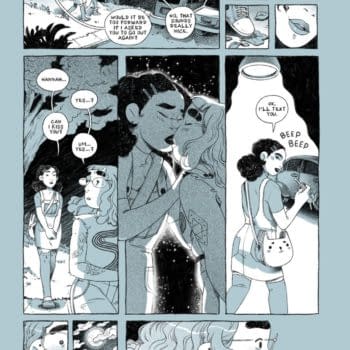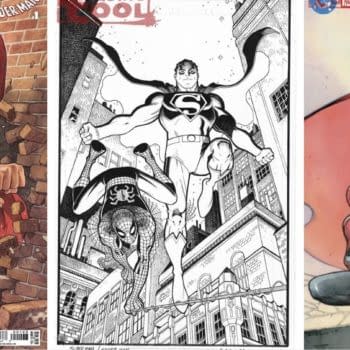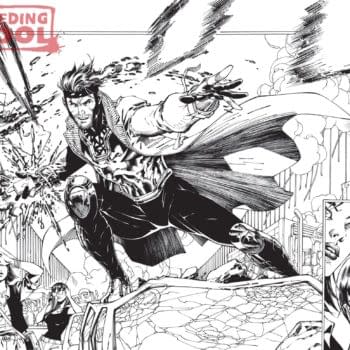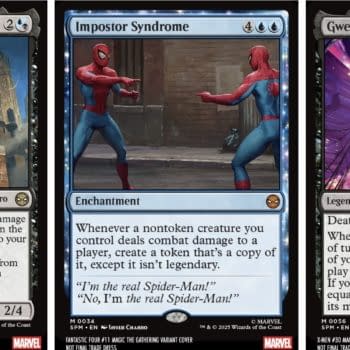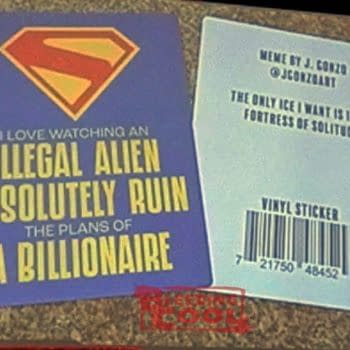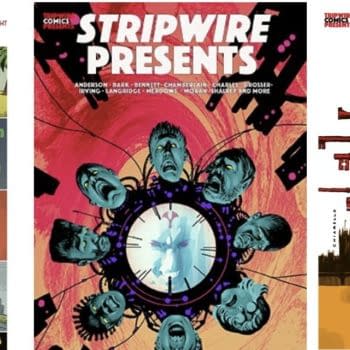Posted in: Comics | Tagged: Comics, dc, marvel
The No Spin Zone – Marvel And DC Executive Interviews
It was the recent ICV2 interview with Marvel Senior Vice President-Sales David Gabriel that did it. Answering a questionnaire with no followups, he managed to dodge some questions by answering different ones, and throw some googlies at the opposing team. But he's hardly alone in this, DC's Executive VP-Sales, Marketing and Business Development John Rood and Senior VP-Sales Bob Wayne were doing something similar the other day on Comic Book Resources.
Here are a few snippets from both interviews – and what they are actually saying in red.
John Rood: To have our number fives sweep the top ten is amazing and really a testament to all the work everyone at DC Comics has put into the New 52. And Bob will say that he much prefers that if we're going to win something, so to speak, that we win unit share versus winning the dollar share.
That thing we said the other month about not caring about market share? We lied.
David Gabriel: Fear Itself surpassed our expectations, as the industry responded with strong orders that made it the top selling story-driven event of the year.
Our expectations were low, the book didn't really affect the sales of the crossovers or spinoffs, DC's relaunch wasn't story driven and One Piece isn't an event so it counts. Honest.
Bob Wayne: I would say that. [Laughter] But I'm talking about myself in the third person now.
I clearly don't know what third person means.
David Gabriel: The introduction of Miles Morales to the Ultimate universe as the new Spider-Man was not only an important moment in pop culture history, it's been an incredibly strong seller for us as well.
Our sales are back to what they were when it starred a white guy.
John Rood: So to see our linewide average so very high through the first half dozen issues, and to see 46 of the 52 going strong with a half dozen titles coming in that by all indications will be stronger than the six they replace, that's the kind of stuff we watch just as closely as who wins the month.
Let's no one mention that Hawk And Dove is outselling Captain Atom. Or that up until two weeks before the announcement, GI Combat #1 was still called Men Of War #7.
David Gabriel: Going into 2012 we're adopting new strategies to combat the perspective that the second tier titles "don't matter" and we're hoping the market reacts favorably.
We're cancelling them and making all our more successful comics twice-monthly.
John Rood: The only titles that do, interestingly, stronger as a percentage of physical sales in digital are publishing franchises with high awareness like "Action" and "Detective" or character franchises with high awareness like Superman, Batman, Flash, Green Lantern and Wonder Woman. And they are still relatively insignificant in total compared to print sales.
We're betting the farm on an insignificant proportion of sales.
David Gabriel: But I look at the January numbers and Marvel has 52 of the top 100 comics–we're seeing a lot of success with our big books and retailers are making a lot of money from them.
Notice I said 52? Of course none of ours are in the top ten.
John Rood: We heard from the retailers that delivery was a critical issue. We certainly heard it on our New 52 road show, and we put the New 52 together with a commitment to a very timely delivery as much as a quality product. I for one am very proud that we've delivered 310 out of 312 issues on time – that is to say six issues of each of the New 52.
I'm deliberately forgetting about what happened with Batgirl.
David Gabriel: The year began with retailers seeing a huge drain on their bottom line when prices from other publishers dropped overnight without any story to increase sales of these price reduced titles. That was tough on a lot of stores and we all saw those dollars disappear from the industry.
We held the line at $3.99.
John Rood: : If our pricing policy is very specific, so too our incentives aren't artificial. We don't deep discount or overprint or do things that give a temporary blip that aren't of value to retailers.
It depends if you consider increasing a store's discount by 40% of what they normally get is deep or not. But it does make those discounted book unit sales chart ranking much higher than their dollar chart ranking. Seriously, look at Wonder Woman. Did we mention how much we like the unit sales ranking?
ICV2: On a book like Point One #1, is any of the overship included in the sales index Diamond reports? And if not, do sales from the overship ever turn up in their sales charts?
David Gabriel: Diamond does not calculate in any dollar amount for free overships.
But they do calculate the number into the unit sales, which is what determines the overall chart placing. So, the answer is yes. I wonder why I didn't just say that.
Bob Wayne: And I think you have to remember that the books in our line that are $3.99 have 40 pages, which are additional story pages. Not every publisher is publishing $3.99 comics that have added pages and added story content.
I'm deliberately forgetting that a number of these are interviews, or previews of upcoming stuff.
David Gabriel: There a lot of factors, but the $3.99 price point was not an issue in 2011–looking at the top selling comics for the year the majority seem to be at that price point. We–in addition to other companies–have used this price point for years and seen strong sales.
The top selling books at $3.99 gave extra content than our usual $3.99 books. Also for years, the $3.99 price point has accompanied an attrition of comic sales across the board.
John Rood: And the innovations that we're bringing to market with Vertigo and with the New 52 and now with Before Watchmen are part of our promise to retailers to innovate and to innovate with integrity.
Regarding the last one, my definition of innovation and integrity may differ from yours.
David Gabriel: We have certain books that are $3.99 and certain books that are $2.99. There's a vast multitude of reasons for how books get priced… those range from page count, to creators, to ratings, and probably a host of other things that I am not thinking of.
I'm trying not to think of what Marvel's John Turitzen said, that they're testing just how much money they can make and just what people are prepared to pay.
David Gabriel: We've cut our line down by about 20 to 25% per month going into 2012. I think this is already evident in the March and April Previews.
Well we fired so many people, what else could we do. But then we increased the amount of issues from each title to help compensate for the books we cut.
David Gabriel: Miles Morales received more press coverage worldwide than nearly anything in comics over the last 15 years.
Apart from the New 52. I keep forgetting that.
David Gabriel: [Regarding hardcover and paperback backlists] There are a lot of factors at play here, one of which is that you just can't take into account the needs of just one retailer, but instead you need to take a look at the overall big picture.
And it's a picture of Isaac Perlmutter.
David Gabriel: Sales of digital comics were up the day of the offer, of the coupons we sent out already, 30% have been downloaded and of that amount another 30% have been redeemed. Anyone with expertise in this area will tell you that's a fairly high redemption and conversion rate.
That's 9% of the vouchers sent out. To people who buy comics, and who wanted the voucher. Giving them free comics. Anyone with expertise in this area will tell you that's a relatively low conversion rate when you are talking about comic book geeks and free stuff.
David Gabriel: I'm also happy to drop here that we'll soon be announcing a major new program in the free digital download content–something no one's done yet; but you'll have to wait a bit to hear more on that.
If Johnston leaks this one in advance as well I'm going to fucking murder him.







